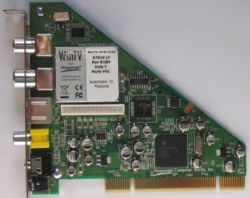Hauppauge WinTV-HVR-1120: Difference between revisions
(→Notes) |
(→Notes) |
||
| (One intermediate revision by the same user not shown) | |||
| Line 73: | Line 73: | ||
On a Debian system, the card worked, but sometimes it entered a state where it produced only i2c errors during tuning, which were visible in dmesg. To be able to make tuning work again, one had to reboot the system. |
On a Debian system, the card worked, but sometimes it entered a state where it produced only i2c errors during tuning, which were visible in dmesg. To be able to make tuning work again, one had to reboot the system. |
||
This misbehaviour seems to be fixed in the 2.6.37 kernel tree, probably thanks to the following patch: [http://git.kernel.org/?p=linux/kernel/git/torvalds/linux-2.6.git;a=commitdiff;h=e350d44fed8eb86a7192a579e3687fcd76a4645b] |
<del>This misbehaviour seems to be fixed in the 2.6.37 kernel tree</del>, probably thanks to the following patch: [http://git.kernel.org/?p=linux/kernel/git/torvalds/linux-2.6.git;a=commitdiff;h=e350d44fed8eb86a7192a579e3687fcd76a4645b] |
||
In 2.6.39, there are more patches to the tda18271 module, which make the driver more stable: [http://git.kernel.org/?p=linux/kernel/git/torvalds/linux-2.6.git;a=history;f=drivers/media/common/tuners/tda18271-fe.c;h=d884f5eee73ca09b547bc168776fe1b89bac0650;hb=61c4f2c81c61f73549928dfd9f3e8f26aa36a8cf]. |
In 2.6.39, there are more patches to the tda18271 module, <del>which make the driver more stable</del>: [http://git.kernel.org/?p=linux/kernel/git/torvalds/linux-2.6.git;a=history;f=drivers/media/common/tuners/tda18271-fe.c;h=d884f5eee73ca09b547bc168776fe1b89bac0650;hb=61c4f2c81c61f73549928dfd9f3e8f26aa36a8cf]. |
||
The card was too unstable/unreliable for me in the long term, so I replaced it with a [[Hauppauge_WinTV-NOVA-T_PCI|WinTV Nova-T PCI]] 928 (Model 90003, rev C2B0). |
|||
Latest revision as of 12:15, 24 March 2012
The Hauppauge WinTV-HVR-1120 is a hybrid analog and DVB-T PCI card.
It sometimes ships in a HVR-1100 box. The HVR-1120, however, is of triangular shape, while the HVR-1100 board is a typical rectangular shaped card. There are significant component differences too.
Support for this card appears to be broken in recent Linux kernels.
Overview/Features
Components Used
- a Philips SAA7131 A/V decoder & bridge
- an NXP TDA10048 digital demodulator
Other Images
Identification
If "lspci -v" shows something like this:
Multimedia controller: Philips Semiconductors SAA7133/SAA7135 Video Broadcast Decoder (rev d1) Subsystem: Hauppauge computer works Inc. Unknown device 6707
with the 6707 at the end, you have a WinTV-HVR-1120.
Installing the HVR-1120
Installing the SAA7134 Driver
The analog tuner of the HVR-1120 runs out of the box. The kernel moduls are already included in the 2.6.20 kernel. No driver installation is required. Look out for something like
kernel: saa7130/34: v4l2 driver version 0.2.14 loaded
in /var/log/messages to make sure the driver is loaded.
Installing the SAA7134-dvb Modules
The WinTV-HVR-1120 needs kernel 2.6.31 as a minimum. In order for the DVB-T to work an additional module, SAA7134-dvb, and the firmware has to be installed. First of all, check whether the module is already installed. Scan through
dmesg
and look out for something like
DVB: registering new adapter (saa7133[0]). DVB: registering frontend 1 (NXP TDA10048HN DVB-T)...
If you find that, than the SAA7134-dvb kernel module is already installed. Please not that in this case the HVR-1120 is the second DVB card registered in the system. You see that since frontend is 1 and not 0. If kernel module is not installed, load it into the kernel like this
modprobe saa7134-dvb.
This should automatically create a folder in /dev:
/dev/dvb/adapterN
where N is an integer. The first dvb card will be numbered starting at N=0, each following card will increase N by one. Issue an
dmesg
command to check whether the kernel module has been loaded. Output should be
DVB: registering new adapter (saa7133[0]) DVB: registering frontend 1 (NXP TDA10048HN DVB-T)...
Installing the Firmware
This card requires a firmware file (dvb-fe-tda10048.fw) for the demodulator, which can be obtained here: [1]
Once the download is complete, place a copy of the firmware file in your /lib/firmware or /usr/lib/hotplug/firmware directory. (This directory may differ with some distros; consult your distro's documentation for the appropriate location).
Making the Modules Load into the Kernel at Startup
In order that the saa7134-dvb module gets loaded at startup add following line
install saa7134 /sbin/modprobe --ignore-install saa7134 && { /sbin/modprobe saa7134-alsa; } && { /sbin/modprobe saa7134-dvb;}
to the modprobe.conf in
/etc/modprobe.conf
Now check whether everything is working as it should. Restart the PC and check the /var/log/messages. Look out for something like:
kernel: DVB: registering new adapter (saa7133[0]). kernel: DVB: registering frontend 1 (NXP TDA10048HN DVB-T)...
telling you the dvb modules got loaded. Please note that in this case the system has two DVB cards. The second one (frontend 1) is the HVR 1120.
tda10048_firmware_upload: waiting for firmware upload (dvb-fe-tda10048-1.0.fw)... saa7134 0000:00:0e.0: firmware: requesting dvb-fe-tda10048-1.0.fw tda10048_firmware_upload: firmware read 24878 bytes. tda10048_firmware_upload: firmware uploading tda10048_firmware_upload: firmware uploaded
tells you that firmware has also been loaded.
Next Step
The next step is to create a channels.conf. To this end follow the link Testing your DVB device
Notes
On a Debian system, the card worked, but sometimes it entered a state where it produced only i2c errors during tuning, which were visible in dmesg. To be able to make tuning work again, one had to reboot the system.
This misbehaviour seems to be fixed in the 2.6.37 kernel tree, probably thanks to the following patch: [2]
In 2.6.39, there are more patches to the tda18271 module, which make the driver more stable: [3].
The card was too unstable/unreliable for me in the long term, so I replaced it with a WinTV Nova-T PCI 928 (Model 90003, rev C2B0).
